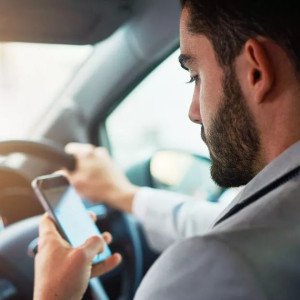Using phone behind the wheel could be made legal again in certain vehicles


It's been reported that using a mobile phone while behind the wheel could become legal in self-driving cars. Currently, autonomous vehicles[1] can be used in the UK in single-lane traffic below 37mph, such as during a motorway traffic jam, but drivers must be ready to regain control within 10 seconds if necessary. However, new research commissioned by the Government suggests that drivers engaged in activities like watching videos on their phone, reading a magazine or playing a game could still regain control of the car within this timeframe.
The report even suggests that these activities might be legalised. While people were slower to react when playing on a phone compared to other activities, they still managed to do so within the 10-second window. Currently, motorists caught using their phone while driving face a GBP200 fine and six penalty points.
It remains illegal to use a phone if the car's self-driving technology is active. However, it is now legal to let technology take the wheel if your vehicle has an automated lane keeping system and is travelling in a single lane at less than 37mph, such as in a motorway traffic jam. In these circumstances, the car itself is responsible for driving and the motorist is not legally required to monitor the road, reports the Mirror[2].
The Telegraph reports that the Highway Code now allows motorists to divert their attention from the road and become a "user-in-charge" rather than the driver when using automated lane keeping system (ALKS) technology on single-lane roads at speeds under 37mph. However, drivers are still prohibited from engaging in illegal activities such as reading or using a phone while the system is active. This could change following studies by Loughborough University and University College London for the Government.
The Department for Transport (DfT) has expressed its commitment to understanding how drivers interact with autonomous vehicles, emphasising that road safety remains its "absolute priority". In research involving nearly 100 participants in driving simulators, scientists observed the time taken and effectiveness of drivers regaining control of the vehicle when prompted. With no final decision yet on what will be permissible for drivers of self-driving cars, the DfT has initiated a second study to assess the safety of transitioning from non-driving tasks back to driving.
A Department for Transport[3] spokesman stated to the Telegraph: "Road safety is our absolute priority, and that's why we commissioned this two-part study to fully understand how drivers interact with self-driving cars."
"Self-driving vehicles could play an important role in our Plan for Change, creating jobs and supporting the industries of the future, but any use of automated vehicles must not compromise road safety.
We'll set out further detail on the regulation and implementation of self-driving vehicles in due course."
References
- ^ autonomous vehicles (www.chroniclelive.co.uk)
- ^ the Mirror (www.mirror.co.uk)
- ^ Department for Transport (www.chroniclelive.co.uk)